 Database
Database
 Mysql Tutorial
Mysql Tutorial
 How to solve the problem that there is no my.ini file in the installed mysql
How to solve the problem that there is no my.ini file in the installed mysql
How to solve the problem that there is no my.ini file in the installed mysql
After using mysql for such a long time, one day I suddenly needed to use the mysql configuration file my.ini and found that there was no such file and that the file was not hidden.
Check if there is my.ini in your mysql. It may be that this file is a hidden file and you have no settings to view hidden files
Generally, mysql is installed in C:\Program In Files\MySQL\MySQL Server 5.7, I seem to have used the installation package to create mysql before, so there is no my.ini file. This file is an important configuration file about mysql. If not, you can do this.
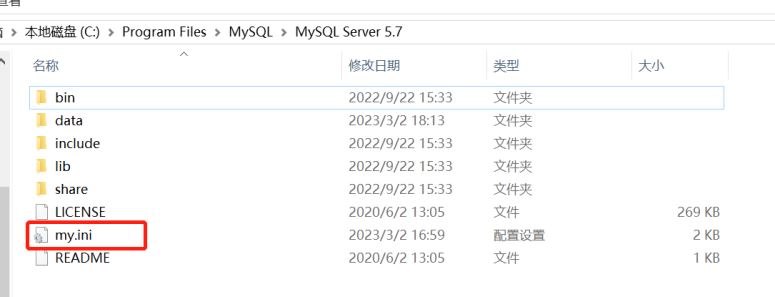
I also did this by reading other people’s articles.
Note, before you prepare to extract the my.ini file, first dump all the data in your previous database to SQL, because in this process, the data file will be deleted and the SQL service will be closed. . Therefore, all previous data will be erased.
The first step to restore my.ini:
Back up local data, how to back it up. Just use Navicat to dump the sql.
Restore my.ini Step 2:
Enter cmd in the bin directory of mysql and press Enter.
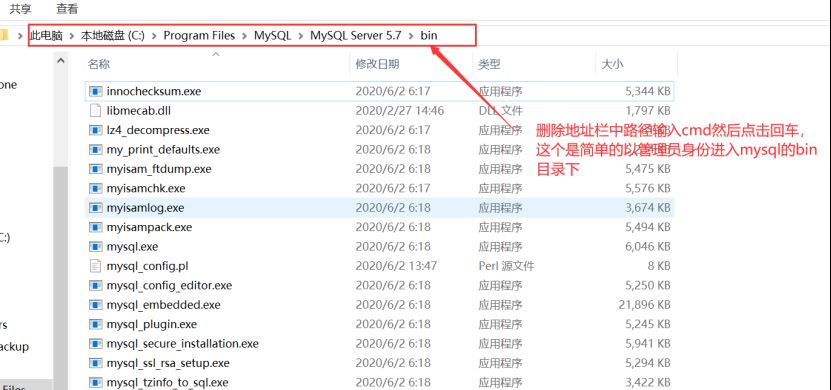
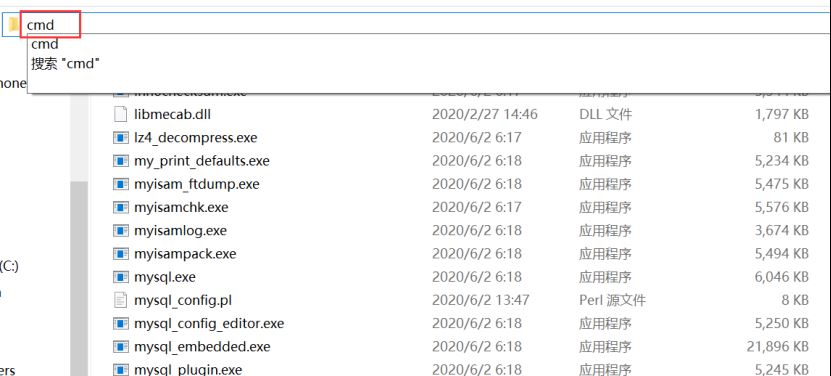
Restore my.ini Step 3:
Enter the command window:
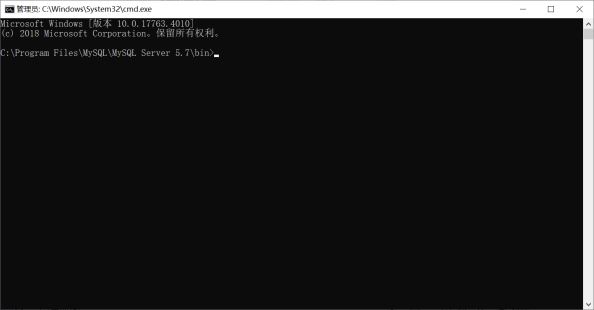
Restore my.ini Step 4:
Delete MySQL service command: sc delete service name.
How to check the service name.
There are many ways. The first one is to find it directly based on your feeling.

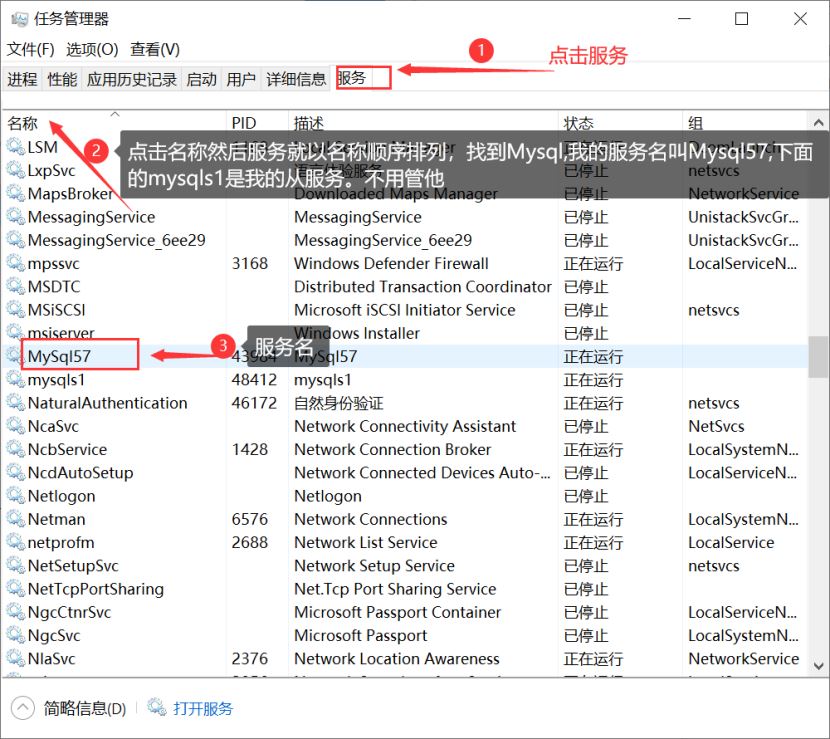
The second is to use the port number search of mysql.
3306 is the default port number of mysql. win R Enter cmd to enter the command line. Enter the command.
netstat -ano | findstr 3306
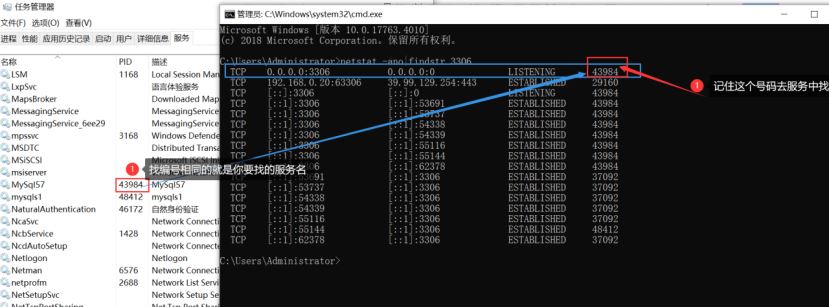
After finding the service name, enter the command:
#MySql57 is my service name
sc delete MySql57
After executing this command, MySql57 This service was deleted while in service.
If you really need to use the screenshot command, I can reconfigure the service, but there is a lot of data on the main service. Improper operation will affect the main service, so I also need to back up the data. The operation of the slave database is the same as that of the master database. Just the name is different. Next I will serve. Let me take a screenshot for you all. The service name of the slave service is mysqls1
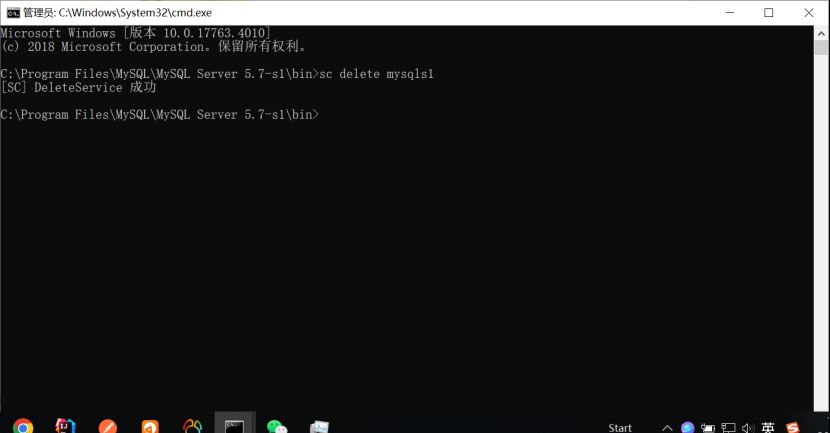
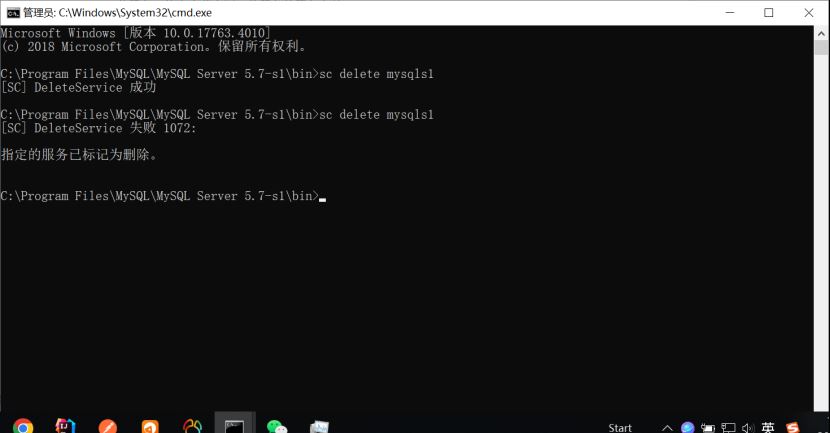
The service must be stopped before deleting it!
If the second situation occurs, one reason is that the service name is wrong. The other is that you have deleted it. In the second case, if the service name cannot be found in the service, it means that you have deleted it.
The fifth step to restore my.ini: Create a new file in the mysql root directory and name the file my.ini

The sixth step to restore my.ini Step: Edit the content in my.ini.
basedir and datadir These two configurations should be edited according to your actual mysql path
# http://dev.mysql.com/doc/refman/5.6/en/server-configuration-defaults.html [client] default-character-set = utf8 [mysql] default-character-set = utf8 [mysqld] character-set-client-handshake = FALSE character-set-server = utf8 init_connect='SET NAMES utf8' # Remove leading # and set to the amount of RAM for the most important data # cache in MySQL. Start at 70% of total RAM for dedicated server, else 10%. innodb_buffer_pool_size = 128M # Remove leading # to turn on a very important data integrity option: logging # changes to the binary log between backups. # log_bin # These are commonly set, remove the # and set as required. #注意这个地方要和你安装mysql的路径保持一致。 basedir = C:\Program Files\MySQL\MySQL Server 5.7 datadir = C:\Program Files\MySQL\MySQL Server 5.7\data port = 3306 # server_id = ..... # Remove leading # to set options mainly useful for reporting servers. # The server defaults are faster for transactions and fast SELECTs. # Adjust sizes as needed, experiment to find the optimal values. join_buffer_size = 128M sort_buffer_size = 16M read_rnd_buffer_size = 16M sql_mode=NO_ENGINE_SUBSTITUTION,STRICT_TRANS_TABLES skip-grant-tables
Restore my.ini Step 7: Generate a new data file in mysql
Enter cmd in the bin directory of mysql and press Enter and then enter the command line.
mysqld --initialize-insecure --user=mysql

#This error occurs because you did not delete the previous data file.

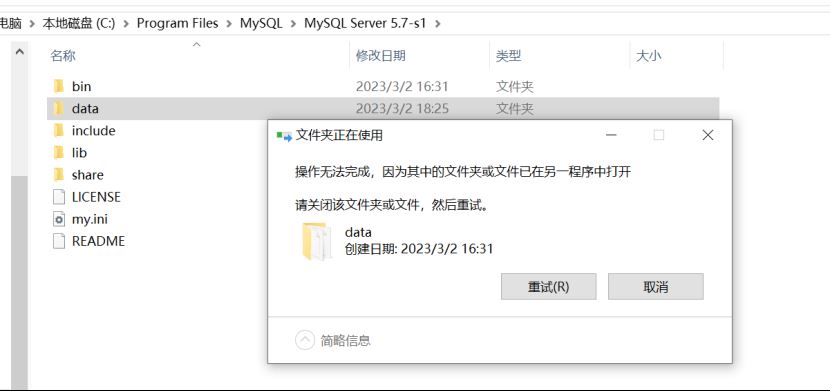
When this happens, I usually use tinder to crush it directly.

If this error occurs, it is probably because these two configurations in your my.ini are incorrect.
basedir = C:\Program Files\MySQL\MySQL Server 5.7-s1 datadir = C:\Program Files\MySQL\MySQL Server 5.7-s1\data
Execute after deletion

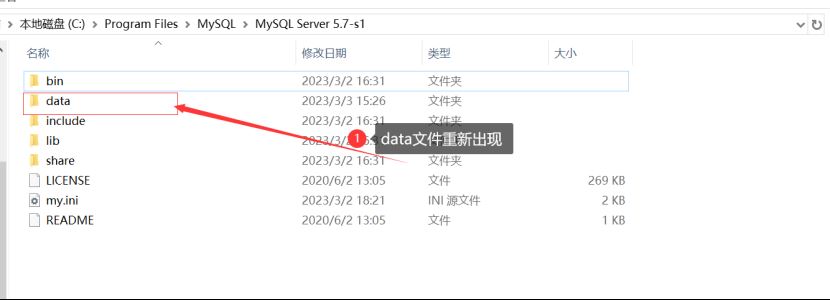
恢复my.ini第八步:重新生成mysql服务,同时绑定my.ini配置文件
输入一下命令。
mysqld --install "MySql57" --defaults-file="C:/Program Files/MySQL/MySQL Server 5.7/my.ini"

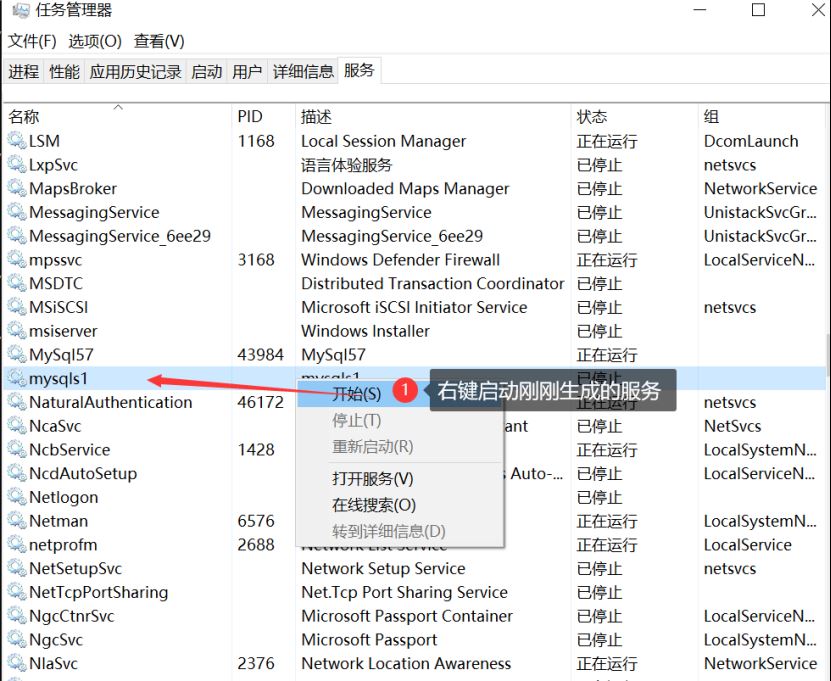
如果无法启动成功重复上面的步骤。不要怕大胆干反也损失不了啥!
重复了好几遍还是不行那大概是端口冲突了吧,把my.ini文件的3306随便改一个。
恢复my.ini第九步:进入mysql修改密码
登录mysql,输入此命令。因为服务刚刚删了所以不用输入密码。
mysql -u root -p
直接回车
进入mysql后,输入
use mysql;
然后再输入
update mysql.user set authentication_string=password("123456") where user="root";然后刷新权限并退出
flush privileges; Quit
The above is the detailed content of How to solve the problem that there is no my.ini file in the installed mysql. For more information, please follow other related articles on the PHP Chinese website!

Hot AI Tools

Undresser.AI Undress
AI-powered app for creating realistic nude photos

AI Clothes Remover
Online AI tool for removing clothes from photos.

Undress AI Tool
Undress images for free

Clothoff.io
AI clothes remover

AI Hentai Generator
Generate AI Hentai for free.

Hot Article

Hot Tools

Notepad++7.3.1
Easy-to-use and free code editor

SublimeText3 Chinese version
Chinese version, very easy to use

Zend Studio 13.0.1
Powerful PHP integrated development environment

Dreamweaver CS6
Visual web development tools

SublimeText3 Mac version
God-level code editing software (SublimeText3)

Hot Topics
 PHP's big data structure processing skills
May 08, 2024 am 10:24 AM
PHP's big data structure processing skills
May 08, 2024 am 10:24 AM
Big data structure processing skills: Chunking: Break down the data set and process it in chunks to reduce memory consumption. Generator: Generate data items one by one without loading the entire data set, suitable for unlimited data sets. Streaming: Read files or query results line by line, suitable for large files or remote data. External storage: For very large data sets, store the data in a database or NoSQL.
 How to optimize MySQL query performance in PHP?
Jun 03, 2024 pm 08:11 PM
How to optimize MySQL query performance in PHP?
Jun 03, 2024 pm 08:11 PM
MySQL query performance can be optimized by building indexes that reduce lookup time from linear complexity to logarithmic complexity. Use PreparedStatements to prevent SQL injection and improve query performance. Limit query results and reduce the amount of data processed by the server. Optimize join queries, including using appropriate join types, creating indexes, and considering using subqueries. Analyze queries to identify bottlenecks; use caching to reduce database load; optimize PHP code to minimize overhead.
 How to use MySQL backup and restore in PHP?
Jun 03, 2024 pm 12:19 PM
How to use MySQL backup and restore in PHP?
Jun 03, 2024 pm 12:19 PM
Backing up and restoring a MySQL database in PHP can be achieved by following these steps: Back up the database: Use the mysqldump command to dump the database into a SQL file. Restore database: Use the mysql command to restore the database from SQL files.
 How to insert data into a MySQL table using PHP?
Jun 02, 2024 pm 02:26 PM
How to insert data into a MySQL table using PHP?
Jun 02, 2024 pm 02:26 PM
How to insert data into MySQL table? Connect to the database: Use mysqli to establish a connection to the database. Prepare the SQL query: Write an INSERT statement to specify the columns and values to be inserted. Execute query: Use the query() method to execute the insertion query. If successful, a confirmation message will be output.
 How to fix mysql_native_password not loaded errors on MySQL 8.4
Dec 09, 2024 am 11:42 AM
How to fix mysql_native_password not loaded errors on MySQL 8.4
Dec 09, 2024 am 11:42 AM
One of the major changes introduced in MySQL 8.4 (the latest LTS release as of 2024) is that the "MySQL Native Password" plugin is no longer enabled by default. Further, MySQL 9.0 removes this plugin completely. This change affects PHP and other app
 How to use MySQL stored procedures in PHP?
Jun 02, 2024 pm 02:13 PM
How to use MySQL stored procedures in PHP?
Jun 02, 2024 pm 02:13 PM
To use MySQL stored procedures in PHP: Use PDO or the MySQLi extension to connect to a MySQL database. Prepare the statement to call the stored procedure. Execute the stored procedure. Process the result set (if the stored procedure returns results). Close the database connection.
 How to create a MySQL table using PHP?
Jun 04, 2024 pm 01:57 PM
How to create a MySQL table using PHP?
Jun 04, 2024 pm 01:57 PM
Creating a MySQL table using PHP requires the following steps: Connect to the database. Create the database if it does not exist. Select a database. Create table. Execute the query. Close the connection.
 The difference between oracle database and mysql
May 10, 2024 am 01:54 AM
The difference between oracle database and mysql
May 10, 2024 am 01:54 AM
Oracle database and MySQL are both databases based on the relational model, but Oracle is superior in terms of compatibility, scalability, data types and security; while MySQL focuses on speed and flexibility and is more suitable for small to medium-sized data sets. . ① Oracle provides a wide range of data types, ② provides advanced security features, ③ is suitable for enterprise-level applications; ① MySQL supports NoSQL data types, ② has fewer security measures, and ③ is suitable for small to medium-sized applications.





